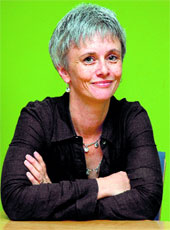 |
Forget about snake charmers and Indian swamis on beds of nails. Susanna Nicklin belongs to a new generation of globetrotting Englishwomen who’ve dumped all those old images of the spiritual Orient. “I’ve heard that it’s a very intellectual society. That it is a dynamic one with people who are always trying to improve themselves. I have heard that India is the envy of the world,” says Nicklin, director, Literature Department, British Council.
Perhaps it’s not surprising that Nicklin has such a positive picture of 21st century India. After all, she has been involved as an agent in the translation of some of India’s top authors like Arundhati Roy, Vikram Seth and Kiran Desai. “Their works are remarkable,” says Nicklin. “Desai’s Hullabaloo in the Guava Orchard, was translated into 15 languages. Vikram Seth’s was translated into more than 25 languages. Arundhati’s God of Small Things was translated into even more.”
Perhaps it was inevitable that Nicklin would build her career in a field like translation. She was brought up in Sussex where her parents ran an English teaching school for foreigners who came from all corners of the globe. Nicklin recalls that her childhood was a like a mini United Nations sessions with about 100 students at any given time of a score of nationalities.
“It was like in one room there will be a Turkish student and in other would be a Spanish student,” says Nicklin, 42. “My whole upbringing was with people from different parts of the world and it was interesting. It made me clear that I wanted to do something with languages.” She speaks French fluently and knows a smattering of Spanish which is enough to get her around the world. She read English at Oxford before taking a plunge into the world of publishing.
She started out at Bodley Head, one of the venerable London names in those days. But she soon switched and joined an international literary agency which specialised in translation rights. As a result she ended up working with lots of internationally famous Indian writers and other top-notch names like Sue Townsend, Fay Weldon and Kate Atkinson.
In 2002 she decided to leave the world of translation behind and became the director of English PEN, the writers’ association promoting literature, literacy and freedom of expression. She stayed for a few years before joining the British Council last October. Nicklin says India is high up in their priority list and there is a large audience for Indian writers in the UK. “Most Indian writers have narrative skills. Often they are able to produce works that are interesting and new to readers in Britain,” she says.
But the exploration of Indian writers, according to Nicklin is nothing new. “It happened some 15-20 years ago. During this era readers in England became interested in the world beyond the White Cliffs of Dover. They began reaching out for authors like Czech writer Milan Kundera, Gabriel García Márquez and African writer J. M. Coetzee.
In that scenario Indian writers turning out English prose suddenly found themselves in the fast track simply because they were more accessible compared to writers in other languages. Says Nicklin: “we have no language barrier with Indian authors.” And that, according to Nicklin is a big asset. “Editors and publishers read their work with interest. And when language is not a barrier, there is nothing that separates authors from editors and publishers. If there are different manuscripts in different languages like Spanish, French, German and English, the editor is most likely to pick up English manuscript. This is where Indian writers score over non-English writers.”
But Nicklin insists that writers like Vikram Seth, Salman Rushdie and Arundhati Roy have resulted in a high regard for Indian writers. That’s because, adds Nicklin, “They are different compared to other writers from other parts of the world. Lots of Indian writers have storytelling skills. And it is important for Anglo Saxon readers to read them.”
Her personal favourite is Vikram Seth’s The Suitable Boy . “It completely pulled readers to a new world. It was captivating as it was set in post-Raj era, an era that is unknown to the Britain.”
Nicklin’s experiences with writers and publishers around the world is bound to stand her in good stead in her new job. In the last few months she has been on the move, travelling to different countries around the world. One new aim is to bring writing in different languages to audiences in the United Kingdom.
Inevitably, Nicklin needs to understand the Indian publishing scene in her new job. She has already made the rounds and dropped in on top publishers and visited bookshops to get a feel for the trade in this country. Also, she’s checking out the market to see what British authors are available in the local market. “When we have writers from the UK coming here, I want to make sure that their books are available here.”
She insists that after years in the book trade she can almost tell a good book just by looking at its cover. What’s she reading right now? One book that’s in her travelling kit is Suketu Mehta’s Maximum City. “I’m loving it. It’s so alive and vibrant,” she says. She says that non-fiction books are hot favourites in Britain currently. So, there’s lots of demand for non-fiction and travel so writers like William Dalrymple are in hot demand.
Nicklin says she decided to come to India skipping the other countries in the sub-continent. But she’ll be visiting them all soon and it’s a safe bet that she’ll be back in India before long.
Photograph by Rupinder Sharma










